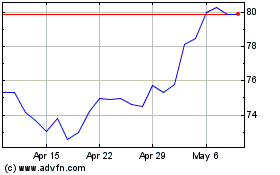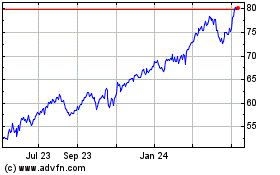Democrats Tussle Over Bill That Contributed to the Financial Crisis
February 11 2016 - 4:17PM
Dow Jones News
By Andrew Ackerman
WASHINGTON--When Hillary Clinton and Bernie Sanders square off
tonight at a debate in Wisconsin, expect more attention to an
unlikely source of friction between the leading Democratic
presidential candidates: a 15-year-old law barring regulation of
complex financial instruments at the heart of the 2008 financial
crisis.
For weeks, Mrs. Clinton has criticized the Vermont senator for
backing the 2000 Commodity Futures Modernization Act, which
prohibited U.S. policy makers from regulating derivatives. The
measure deregulated the types of mortgage-related swaps and other
derivatives that backfired during the crisis, contributing to the
collapse of Lehman Brothers Holdings Inc. and the near-collapse of
firms like American International Group Inc.
"You're the one who voted to deregulate swaps and derivatives in
2000, which contributed to the overleveraging of Lehman Brothers,
which was one of the culprits that brought down the economy," Mrs.
Clinton said at a Democratic debate last week.
Derivatives, including swaps, are used by banks and other firms
to hedge--or speculate--on everything from moves in interest rates
to the cost of fuel.
Mr. Sanders, who has made breaking up the biggest U.S. banks a
top policy goal, has yet to directly respond to the criticism,
saying nobody has fought harder against Wall Street-backed
legislation in Congress than he has.
Now one of his top aides says the senator's "yes" vote in 2000
was a mistake, and he blames the administration of President Bill
Clinton, Mrs. Clinton's husband. The Clinton administration was
aggressively supporting the legislation at the time, and Mr.
Clinton signed it into law. The former president, however, now says
he, too, received bad advice.
"It was a mistake to listen to the Clinton administration's
economic advisers who were so successful in pushing for this bill
that only four members of Congress voted against it," said Warren
Gunnels, a policy adviser to Mr. Sanders. He was referring to a
stand-alone House vote on the bill in October 2000, when Mr.
Sanders was a member of the House of Representatives. A similar
version of the bill eventually cleared both chambers of Congress
two months later after it was added to must-pass legislation
funding the federal government.
The fight over the 15-year-old legislation is the latest
illustration of how deep divisions over Wall Street have come to
define the presidential campaigns of the two leading Democratic
candidates. Mr. Sanders, citing what he sees as greed and
irresponsibility on Wall Street, has put forth proposals that would
reshape American finance, promising to break up the biggest banks
in his first year in office.
Mrs. Clinton has taken a more surgical approach. Her campaign
has developed more than two dozen ideas that form a web of
regulation, prosecution and taxation aimed at deterring what she
considers bad behavior.
Though once considered a long-shot candidate, Mr. Sanders
finished the Iowa caucuses in a dead heat with Mrs. Clinton, and he
decisively beat the former secretary of state in the New Hampshire
primary this week. The nominating contest now moves to South
Carolina and other southern states with large minority populations
where Mrs. Clinton's campaign is banking on a revival.
Mr. Gunnels said the criticism of Mr. Sanders's record is
"disingenuous" because the 2000 law had the backing of not only
Mrs. Clinton's husband but also Gary Gensler, a Treasury Department
official at the time who was intimately involved in advancing the
bill through Congress. Mr. Gensler is now the chief financial
officer of Mrs. Clinton's campaign.
"As soon as Sen. Sanders learned how bad this bill was he worked
to repeal it," said Mr. Gunnels. Mr. Sanders also led the
opposition to Mr. Gensler's 2009 nomination to head the Commodity
Futures Trading Commission--which gained authority to regulate
swaps after the crisis--because of Mr. Gensler's role in
spearheading passage of the 2000 law, Mr. Gunnels said.
Most Democratic lawmakers and liberal groups later cheered Mr.
Gensler's bare-knuckle approach to rule-making--a surprising turn
for the former Goldman Sachs Group Inc. executive and one-time
champion of deregulation. Despite that reputation, Mr. Gensler has
long been a target of Mr. Sanders, largely over high-profile CFTC
rules designed to curb bets on oil, gold and other commodities that
Mr. Sanders believes didn't go far enough to limit speculation. A
federal court eventually sent the rules back to the CFTC, ruling
the agency didn't do enough to justify their burdens.
For Mrs. Clinton, raising concerns about Mr. Sanders's voting
record allows her to deflect criticism that her own relationship
with Wall Street is cozy. She has accepted millions in donations
and speaking fees from large firms, but says she never changed a
view or a vote because of a contribution.
"I'm not impugning your motive because you voted to deregulate
swaps and derivatives," she said of Mr. Sanders at last week's
debate. "People make mistakes and I'm certainly not saying you did
it for any kind of financial advantage. What we've got to do as
Democrats is to be united to actually solve these problems. And
what I believe is that I have a better track record and a better
opportunity to actually get that job done."
Write to Andrew Ackerman at andrew.ackerman@wsj.com
(END) Dow Jones Newswires
February 11, 2016 16:02 ET (21:02 GMT)
Copyright (c) 2016 Dow Jones & Company, Inc.
American (NYSE:AIG)
Historical Stock Chart
From Mar 2024 to Apr 2024

American (NYSE:AIG)
Historical Stock Chart
From Apr 2023 to Apr 2024
